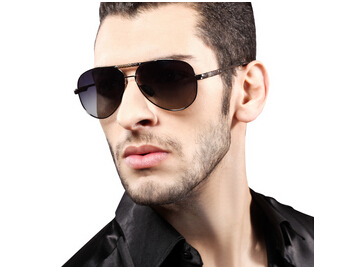(单词翻译:单击)

And now, Science of Us attempts to unravel the answers to a summertime question of monumental importance: Why does nearly everyone instantly look more attractive with sunglasses on?
据《纽约杂志》网站6月23日报道,现在,《我们的科学》栏目将解开一个长期以来十分重要的夏日之谜:为什么几乎所有人戴上墨镜之后都会立刻显得更吸引人?
You know you’re at least a little curious. And so was Vanessa Brown, a senior lecturer of art and design at Nottingham Trent University in the U.K. Her research focuses on the meaning we assign to commonplace, everyday objects, and in an academic book that’s coming out early next year, she explores the cultural and psychological relationship between sunglasses and our modern idea of “cool.” In an email to Science of Us, Brown explained what her research has uncovered about why most of us look better in shades.
你知道你对这个问题还是有点儿好奇,英国诺丁汉伦特大学艺术与设计专业高级讲师瓦内萨·布朗也对这个问题感到好奇。她进行了一项研究,重点关注我们赋予寻常事物的意义。在她明年年初即将出版的一本学术著作里,她从文化和心理学的角度分析了墨镜和当代社会所定义的“酷”之间的关系。布朗向《我们的科学》栏目发了一封电子邮件,向我们解释了她的研究成果,即为什么我们戴上墨镜更好看。
Because they really do make your misshapen face look better. Put on a pair of sunglasses, and voilà – instant symmetry! The dark lenses cover up any asymmetrical oddities around your eyes, and research on facial attractiveness shows a clear link between symmetry and our perception of beauty.
因为墨镜确实让你那不规则的脸变得更好看。戴上一副墨镜之后再看看你的脸——马上变对称了有木有!黑色的镜片将你眼睛周围不对称的部位都掩盖了,而有关面部吸引力的研究表明,对称性与我们对美的看法有着千丝万缕的联系。
As an added bonus, Brown pointed out, sunglasses provide a kind of scaffolding effect, imposing the appearance of an external, extra-chiseled bone structure on top of your relatively softer-featured face.
另外,布朗还指出,墨镜就像脚手架一样,可以让你相对平坦的面部骨骼显得更立体有型。
Because mystery. Many of the snap judgments we form about people come from looking them in the eyes; shade yours, and you’re instantly a more intriguing presence. “The eyes are such a tremendous source of information — and vulnerability — for the human being,” Brown explained. Eye contact helps us form judgments about someone’s intelligence, confidence, andsincerity, and sunglasses keep us literally in the dark about forming those perceptions about a person. And it works both ways, because the wearer of the sunglasses feels more inscrutable, too. One recent study showed that people who wore sunglasses acted more selfishly and dishonestly than those wearing eyeglasses, which, the researchers argue, suggests that shades delude us into feeling more anonymous, or unknown.
原因就在于神秘感。我们对于人的第一印象大都来自于他们的眼睛,如果你把眼睛遮住,你的外貌就会立刻变得更吸引人。“眼睛对于人类来说是相当重要的信息来源,也是识别弱点的工具。”布朗解释说,眼神交流有助于我们判断一个人的智力、自信和诚意,而墨镜让我们无法对别人进行判断。反过来也是一样,因为戴墨镜的人也会觉得自己更令人难以捉摸。最近的一项研究显示,戴墨镜的人比戴普通眼镜的人的行为更自私和不诚实,尽管研究人员对此还有争议,但也说明墨镜会让我们产生自己处于匿名状态或神不知鬼不觉的感觉。
It's colloquial wisdom that an air of mystery increases sexual desire, and research bears that notion out. Think of the common “the thrill is gone” complaint that accompanies the long-term relationship, for one. And one recent study showed that women who were uncertain of a man's feelings toward them ended up reporting more attraction to those men. It's essentially the plot of many a rom-com: We're drawn to the people we can't quite figure out.
俗话说得好,越神秘,越诱惑。研究结果证实了这一观点。例如,想一想人们总是抱怨一段长期感情中“激情不再”。最近的一项研究表明,女人越是对男人采取暧昧不清的态度,那么这个男人就对她越着迷。这本质上就是浪漫喜剧片的桥段:我们总是对自己猜不透的人着迷。
Because of their historical link with edginess and glamour. We take their ubiquity for granted today, but sunglasses are a relatively modern everyday accessory, Brown said. Sales started to pick up in the 1920s, but they didn’t become commonplace until about two decades after that. The way sunglasses were most often used prior to their commercialization helps explain some of their inherent coolness, Brown said, because in their early days sunglasses were primarily used during risky water and snow sports, and were also associated with new technologies like airplane travel, which made them seem “daring and thoroughly modern.”
布朗说,由于墨镜一直以来都是“犀利”和“迷人”的代名词,所以我们现在总是觉得它的普及是理所应当的,但墨镜直到相对现代的时期才成为日常饰品。墨镜的销量在上世纪二十年代开始增加,但直到40年代才飞入寻常百姓家。布朗说,在过去人们更注重墨镜的用途,而不是大肆宣传其与生俱来的冷酷气质,因为早期的墨镜主要用于水上和雪上冒险运动,并且往往和飞行旅行这类新技术联系在一起,这能彰显墨镜“无畏和现代化”的气质。
Soon after that, Hollywood stars of the 1950s and 1960s started wearing sunglasses to defend themselves from being recognized by the public or harassed by paparazzi, whose flashbulbs would often explode violently, sometimes literally in their faces, Brown said. But regardless of practicality, movie stars’ adoption of the accessory cemented the link between sunglasses and glamour.
布朗说,在那之后不久,五六十年代的好莱坞明星们开始佩戴墨镜以防止在公共场所被人认出来,或是防备狗仔队记者的骚扰,这些狗仔队记者疯狂拍照,有时甚至把闪光灯都凑到明星脸上了。但抛开墨镜的实用性不谈,明星们戴墨镜确实加强了墨镜与“魅力”之间的联系。
Also – and this is more from my own personal research than Brown’s — hang-overs. They’re really great for hiding hang-overs.
另外,我个人认为,宿醉也是墨镜受欢迎的原因之一,因为墨镜是掩盖宿醉后囧相的绝佳装备。


